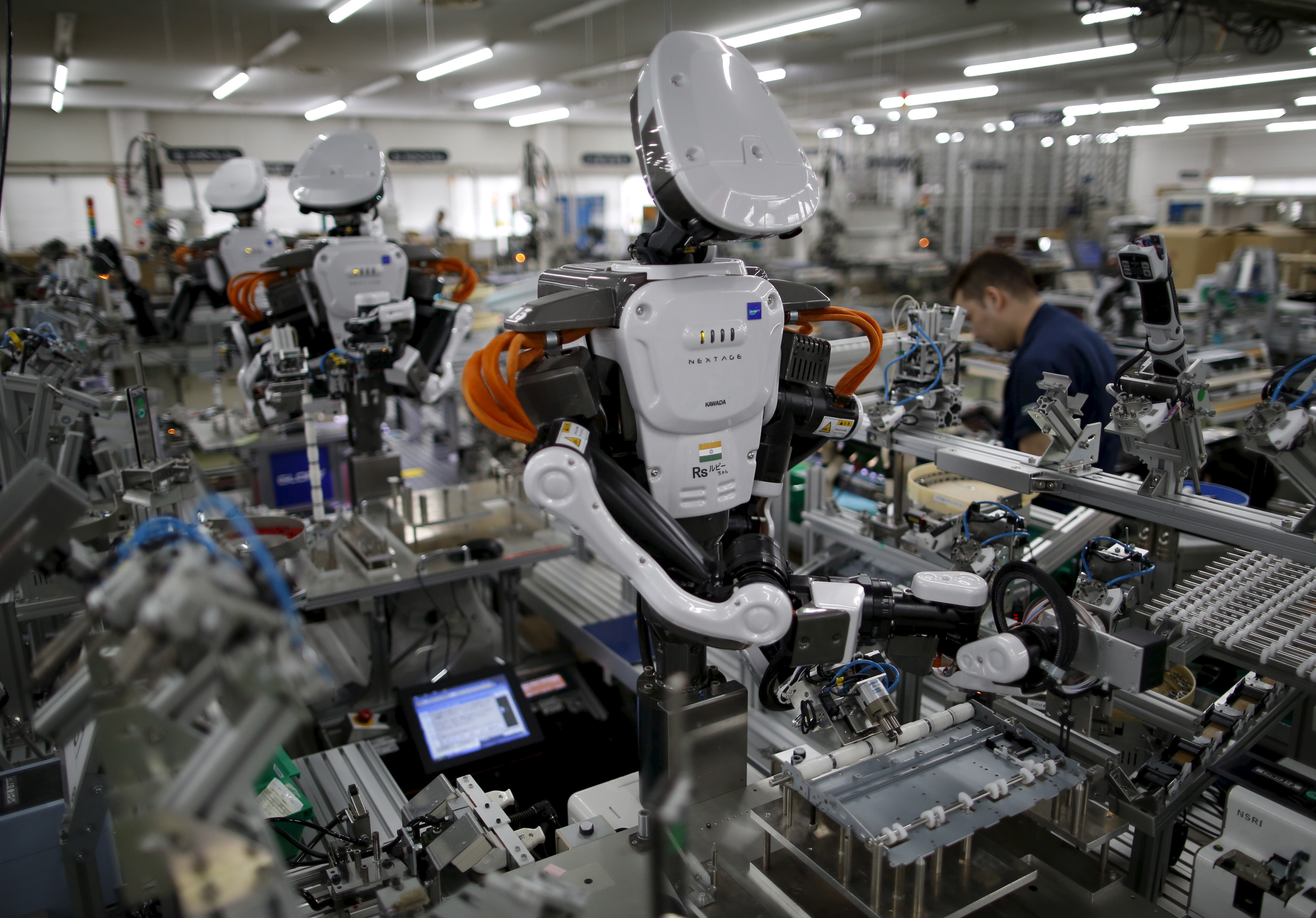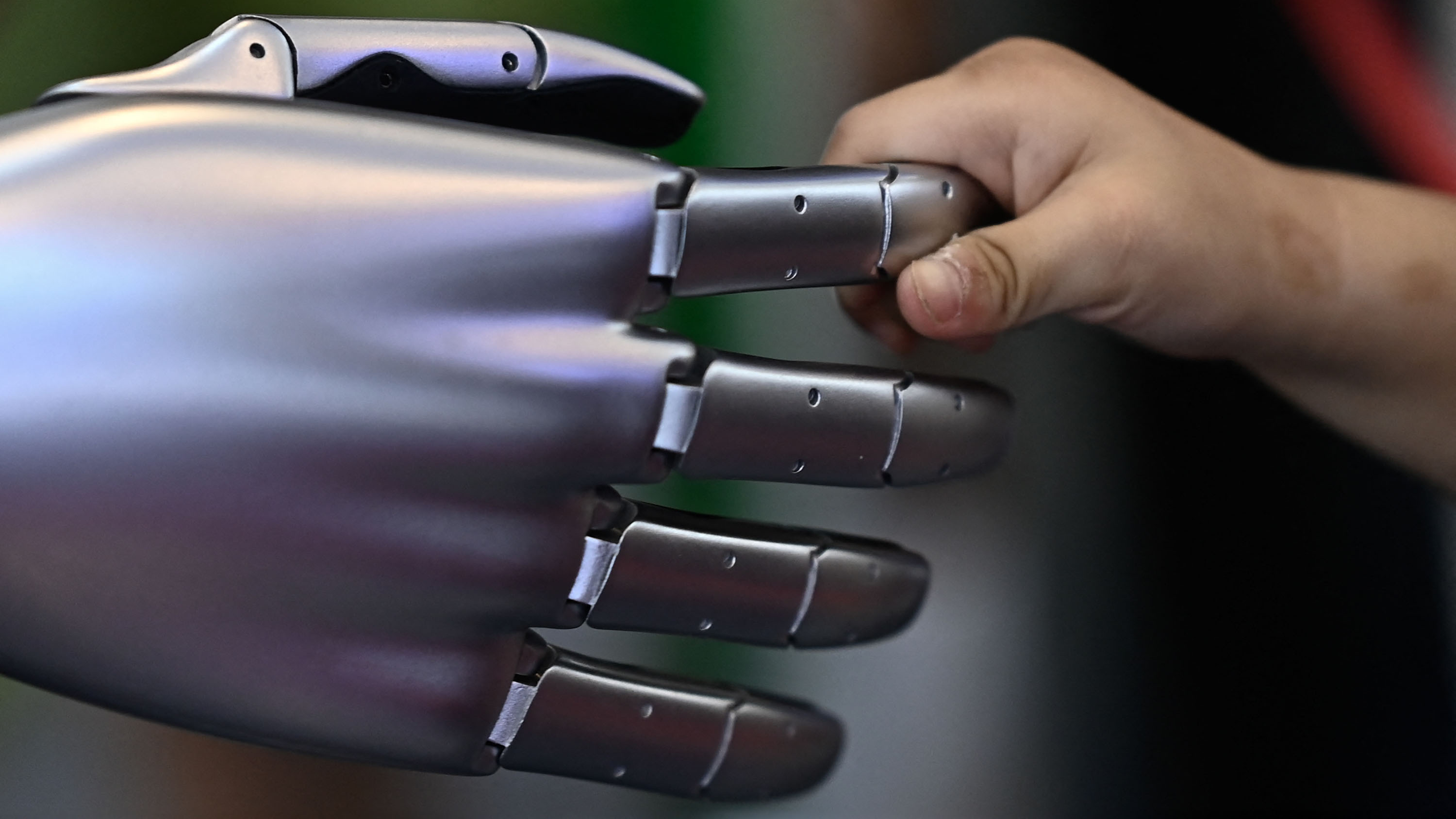America's economic future isn't about factory jobs and trade deals. It's about robots.
Don't stop thinking about tomorrow. Yesterday's gone. Yesterday's gone!


Imagine, just for a moment, that President-elect Donald Trump's savvy "deal-making" (read: the veiled threat of government retaliation) with U.S. manufacturers like Carrier can keep 1,000 jobs a day from heading overseas. That works out to roughly 1.5 million jobs over his four-year presidential term. Let's even throw in a couple dozen 50,000-jobs packages like the one Trump apparently secured from SoftBank Group Corp. CEO Masayoshi Son to make it a nice, round 2.5 million jobs.
Now, this assumes a good chunk of President Trump's time is spent haggling over the phone. Which might be just fine with Vice President Mike Pence, House Speaker Paul Ryan, and Senate Majority Leader Mitch McConnell. If Trump is talking, then he's not tweeting. And they could run the federal government while Trump is busy making America great again.
But instead of cajoling factory bosses or trying to rework 25-year-old trade deals, a modern, forward-looking American president would take note of Amazon Go, the online retailer's new brick-and-mortar grocery store project. Walk in, flash your phone, then grab and go. It's "frictionless," meaning no human cashiers to deal with. So what does this portend for the nation's 3.5 million cashiers?
Subscribe to The Week
Escape your echo chamber. Get the facts behind the news, plus analysis from multiple perspectives.

Sign up for The Week's Free Newsletters
From our morning news briefing to a weekly Good News Newsletter, get the best of The Week delivered directly to your inbox.
From our morning news briefing to a weekly Good News Newsletter, get the best of The Week delivered directly to your inbox.
Along the same lines, what do autonomous vehicles mean for the nation's nearly 3 million truck drivers? Toss in taxi and bus drivers, and it's another million jobs. Indeed, most of the decline in factory jobs has been due to automation rather than offshoring to cheaper labor markets overseas. Indeed, "now the chief executive of United Technologies, Carrier's parent company, says in the end, many of those jobs (he put the figure at 800) likely will fall to automation rather than Mexico," says The New York Times.
There are lots of competing forecasts about how automation will gobble up American jobs. A recent McKinsey analysis of job automation risk found nearly half of current job tasks could be automated "using already demonstrated technology" — but fewer than 5 percent of jobs could be entirely automated. The caveat here, as with all such analyses, is that emerging technologies could change these calculations and make more jobs vulnerable. Regardless, it seems safe to say that smart robots and software will at least do more and more routine or repetitive bits of jobs, hopefully allowing workers more time to focus on the creative, design, or emotion-driven parts of their work.
Robots do not mean "The End of Jobs," as a New York Post headline about Amazon Go screamed. An OECD automation report notes that new technologies "may also exert positive effects on labor demand if they raise product demand due to an improved competitiveness and a positive effect on workers' incomes." Technology can make us more productive and valuable — and create more jobs. When automatic teller machines came along, everyone assumed bank tellers would vanish. They actually kept increasing, though at a slower pace. As James Bessen explains in Learning by Doing: The Real Connection between Innovation, Wages, and Wealth, although banks slashed the number of tellers at their branches, they opened more branches since each one became cheaper to operate.
Of course, advancing automation will pose challenges. The Industrial Revolution worked out pretty well in the end, but it was a wrenching transformation for workers. We need to prepare now by making sure we have a high-innovation, high-wage economy where technological advances create new sorts of jobs and industries, not just replace current ones with machines. And we need to make sure we have a workforce ready to fill these jobs, and a modernized safety net for when they aren't.
Yet here we are, obsessing about globalization and trade deficits. Or about the illegal immigration of low-skilled workers. These are yesterday's problems.
Economist Adam Ozimek at Moody's Analytics notes that the China trade shock "has largely passed. Trade with China is mostly liberalized now, and the worst trade-related job losses are behind us." Same goes for low-skill immigration. Even assuming this has been bad for some American workers, "wages have risen and fertility rates have fallen in the poorest Mexican states that have sent the most immigrants in recent years, and this has already reduced migration rates."
Some people get it. After Trump trumpeted his Carrier deal, Sen. Ben Sasse, a Nebraska Republican who has long been critical of Trump, let go with a reality-check tweetstorm. Among the highlights:
Exactly right. We can't reverse globalization. And we aren't going to smash the machines. Presidential phone calls won't do the trick. Telling workers otherwise would be conning them.
Sign up for Today's Best Articles in your inbox
A free daily email with the biggest news stories of the day – and the best features from TheWeek.com
James Pethokoukis is the DeWitt Wallace Fellow at the American Enterprise Institute where he runs the AEIdeas blog. He has also written for The New York Times, National Review, Commentary, The Weekly Standard, and other places.
-
 The Week Unwrapped: Will robots benefit from a sense of touch
The Week Unwrapped: Will robots benefit from a sense of touchPodcast Plus, has Donald Trump given centrism a new lease of life? And was it wrong to release the deadly film Rust?
-
 The week's best photos
The week's best photosIn Pictures A dancing couple, a new pope, and more
-
 How to create your perfect bedscape
How to create your perfect bedscapeThe Week Recommends Nighttime is the right time to get excited about going to bed